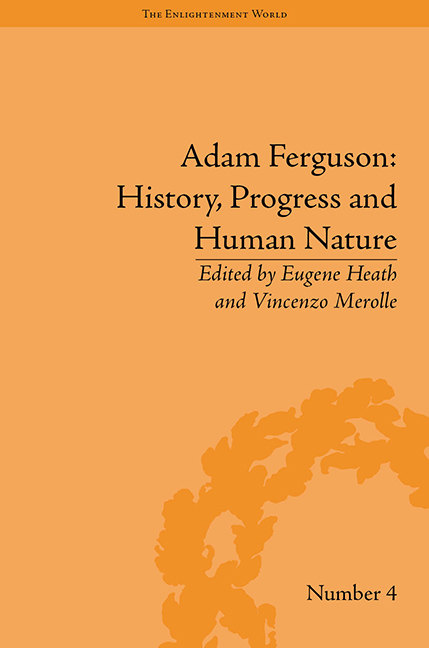Book contents
- Frontmatter
- CONTENTS
- Contributors
- Introduction
- I Life and Works
- II In History
- III On History
- 7 Ferguson, Roman History and the Threat of Military Government in Modern Europe
- 8 Ferguson's ‘Appropriate Stile’ in Combining History and Science: The History of Historiography Revisited
- IV Human Nature, Action and Progress
- Notes
- Works Cited
- Index
8 - Ferguson's ‘Appropriate Stile’ in Combining History and Science: The History of Historiography Revisited
from III - On History
- Frontmatter
- CONTENTS
- Contributors
- Introduction
- I Life and Works
- II In History
- III On History
- 7 Ferguson, Roman History and the Threat of Military Government in Modern Europe
- 8 Ferguson's ‘Appropriate Stile’ in Combining History and Science: The History of Historiography Revisited
- IV Human Nature, Action and Progress
- Notes
- Works Cited
- Index
Summary
Adam Ferguson's place in the history of ideas has been understood variously. For example, some have portrayed him as an early founder of modern sociology, but others have interpreted his thought as representative of the ideal of civic humanism. However, Ferguson is rarely recognized for his work as a historian, in contrast to the famous English-speaking historians of the Enlightenment, David Hume, William Robertson and Edward Gibbon. This is all the more surprising given that Ferguson not only undertook historical work but also reflected theoretically on the writing of history. In this essay I investigate why it is that Ferguson has played only a minor role in the history of historiography. My argument focuses on how Ferguson's marginalization may derive from his theoretical conception of history as combining empirical and rational elements. Ferguson's unique contribution, his ‘Appropriate Stile’, develops from David Hume's conception of history, anticipates nineteenth-century hermeneutics, and suggests that the focus of historical research should be the species, or ‘mankind’.
Oscillating between moral philosophy, erudite historical narrative and the science of natural history, Ferguson's historical essays are not easily categorized. As a preliminary consideration one might seek to situate his work within either the history of historiography or the history of science. On the one hand, however, the history of historiography does not accept the constraints of the naturalistic approach that Ferguson advocated; on the other hand, the history of science does not respect the forms of historical erudition to which he applied his methodological considerations. As an alternative, one might consider that Ferguson's contributions to political or civil history offer a categorical contrast to his work in the science of natural history. However, since his theoretical considerations embraced both of these genres, it seems problematic to differentiate between his idea of ‘history’ and his concept of ‘natural history’. After all, the term historia implies that empirical circumstances are relevant for both types of inquiry. The specific order of historical material and its narrative construction were traditionally subsumed under the ‘artes historicae’, engendering thereby the long-lasting debate about the appropriate style or method in writing history.
- Type
- Chapter
- Information
- Adam FergusonHistory, Progress and Human Nature, pp. 131 - 146Publisher: Pickering & ChattoFirst published in: 2014



